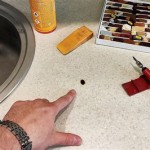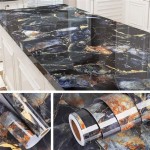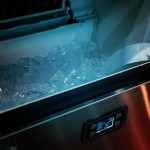Removing Rust Stains From Quartz Countertops
Quartz countertops, known for their durability and aesthetic appeal, are a popular choice for kitchens and bathrooms. Composed of natural quartz combined with resins and pigments, these surfaces are generally resistant to stains and scratches. However, rust stains can occasionally appear, detracting from the countertop's pristine appearance. Addressing these stains promptly and effectively is crucial to maintaining the countertop’s longevity and beauty.
Rust stains on quartz countertops typically originate from metallic objects left in contact with the surface, particularly in areas prone to moisture. Common culprits include cast iron cookware, metal cans, and even certain cleaning tools with metallic components. When these objects come into contact with water or other liquids and are left undisturbed for an extended period, a chemical reaction occurs, leading to the formation of iron oxide, which presents as a rust stain. The porosity of the resins used in manufacturing quartz countertops, while relatively low, can still allow rust particles to penetrate the surface, making removal slightly challenging if left untreated for significant durations.
Identifying the source of the rust stain is the first step in preventing recurrence. Once the source is identified and removed, attention can turn to the stain itself. Several methods can be employed to remove rust stains from quartz countertops, ranging from gentle household solutions to specialized cleaning products. The selection of the appropriate method depends on the severity and age of the stain, as well as the type of finish on the quartz surface. It is always advisable to test any cleaning solution in an inconspicuous area before applying it to the stain directly, ensuring that it does not cause discoloration or damage to the countertop.
Assessing the Stain and Gathering Supplies
Before initiating the cleaning process, a thorough assessment of the rust stain is necessary. This involves determining the size and intensity of the stain, as well as evaluating the surrounding area for any existing damage or vulnerabilities. A clear understanding of the stain's characteristics will help determine the most suitable cleaning approach and minimize the risk of damaging the countertop. Furthermore, it is important to gather all necessary supplies before starting the cleaning process to ensure a smooth and efficient operation. These supplies may include:
- Soft cloths or microfiber towels: These are essential for applying cleaning solutions and wiping away residue without scratching the quartz surface.
- Spray bottle (optional): A spray bottle can be helpful for applying cleaning solutions evenly across the stained area.
- Baking soda: A gentle abrasive that can help lift rust stains from the surface.
- White vinegar: A mild acid that can dissolve rust.
- Lemon juice: Similar to vinegar, lemon juice contains citric acid, which can help break down rust.
- Dish soap: A mild detergent for cleaning the surface after rust removal.
- Soft-bristled brush (optional): For scrubbing stubborn stains, a soft-bristled brush can be used with caution.
- Rust stain remover specifically formulated for quartz (optional): If other methods fail, a specialized cleaner may be necessary.
- Gloves: To protect hands from cleaning solutions.
Having these supplies readily available will streamline the cleaning process and increase the likelihood of a successful outcome.
Gentle Cleaning Methods: Baking Soda and Dish Soap
For light rust stains, a simple mixture of baking soda and dish soap can be effective. Baking soda acts as a mild abrasive, while dish soap helps to lift the stain and clean the surface simultaneously. To implement this method, a paste should be prepared by combining baking soda and a few drops of dish soap with a small amount of water. The consistency of the paste should be thick enough to adhere to the stain without running.
The paste is then applied directly to the rust stain, ensuring that it completely covers the affected area. Allow the paste to sit on the stain for approximately 15 to 30 minutes. This dwell time allows the baking soda to penetrate the rust and loosen its grip on the quartz surface. After the allotted time, gently scrub the stain with a soft cloth or sponge. Avoid using excessive force or abrasive materials, as this could potentially scratch the countertop. If the stain persists, repeat the process or try a different cleaning method.
Once the stain has been removed, thoroughly rinse the area with clean water to remove any remaining baking soda and dish soap residue. Dry the surface with a clean, soft cloth. Examine the treated area carefully to ensure that all traces of the rust stain have been eliminated. If any discoloration or residue remains, repeat the cleaning process or consider using a stronger cleaning solution.
Using Vinegar or Lemon Juice for Stubborn Stains
For more persistent rust stains, vinegar or lemon juice can be employed as a natural cleaning agent. Both substances contain mild acids that can effectively dissolve rust without causing significant damage to the quartz surface. White vinegar is typically preferred due to its readily available nature and neutral color, which minimizes the risk of staining the countertop; however, lemon juice can also be used as an alternative. To use vinegar or lemon juice for rust removal, the following steps should be followed:
- Dilute the vinegar or lemon juice with water. A 1:1 ratio is generally recommended, but the concentration can be adjusted based on the severity of the stain.
- Apply the diluted solution directly to the rust stain, ensuring that the entire affected area is saturated.
- Allow the solution to sit on the stain for approximately 30 minutes to 1 hour. This dwell time allows the acid to react with the rust and break it down.
- After the allotted time, gently scrub the stain with a soft cloth or sponge. Avoid using abrasive materials or excessive force.
- Rinse the area thoroughly with clean water to remove any remaining vinegar or lemon juice residue.
- Dry the surface with a clean, soft cloth.
If the stain is particularly stubborn, the process can be repeated multiple times. Alternatively, a paste can be created by mixing vinegar or lemon juice with baking soda to form a thicker consistency. This paste can then be applied to the stain and left to sit for a longer period of time before scrubbing and rinsing.
It is important to note that while vinegar and lemon juice are generally safe for use on quartz countertops, prolonged exposure to highly concentrated solutions can potentially damage the surface. Therefore, it is crucial to dilute the solution appropriately and avoid leaving it on the countertop for extended periods of time. Additionally, always rinse the treated area thoroughly with clean water after cleaning to remove any remaining acid residue.
Specialized Rust Stain Removers
When household remedies prove ineffective, specialized rust stain removers designed for quartz surfaces may be necessary. These products typically contain stronger chemical agents that can dissolve even the most stubborn rust stains. However, it is crucial to exercise caution when using these products, as they may potentially damage the countertop if used improperly. Before using any specialized rust stain remover, it is essential to carefully read and follow the manufacturer's instructions.
Typically, these products are applied directly to the stain and allowed to sit for a specified period of time, as indicated on the label. After the dwell time, the area is typically scrubbed gently with a soft cloth or sponge and then rinsed thoroughly with clean water. It is imperative to wear gloves and eye protection when handling these chemicals to prevent skin and eye irritation.
Before applying a specialized rust stain remover to the entire stained area, it is highly recommended to test the product in an inconspicuous location on the countertop. This will help to determine if the product causes any discoloration or damage to the surface. If no adverse effects are observed, the product can be safely applied to the rust stain. It is important to note that some rust stain removers may have a strong odor, so adequate ventilation is necessary when using these products.
After using a specialized rust stain remover, it is essential to thoroughly rinse the treated area with clean water to remove any remaining chemical residue. This will help to prevent any potential damage or discoloration to the countertop. Once the surface is dry, a quartz countertop polish can be applied to restore its shine and protect it from future stains.
In cases of severe or extensive rust staining, professional cleaning services may be required. Professional cleaners have access to specialized equipment and cleaning solutions that can effectively remove rust stains without damaging the quartz surface. Before hiring a professional cleaner, it is important to obtain multiple quotes and verify their experience and credentials.

How Can I Remove Rust Stains From A Cultured Quartz Countertop Surface Home Improvement Stack Exchange

The Easy Guide For How To Clean Quartz Countertops Tidbits Twine

Removing A Rust Stain From Quartz Countertop

How To Get The Rust Off Your Quartz Countertops In Seconds

Housecleaning Tips Removing Rust From Countertops

How To Treat Rust Stains On Your Quartz Countertops Common Mistakes Avoid

How To Treat Rust Stains On Your Quartz Countertops Common Mistakes Avoid

Can Remove Rust Stains From Quartz Countertops Wabisabigroup Com

How To Treat Rust Stains On Your Quartz Countertops Common Mistakes Avoid

How To Remove Rust From Countertop Easy
See Also








